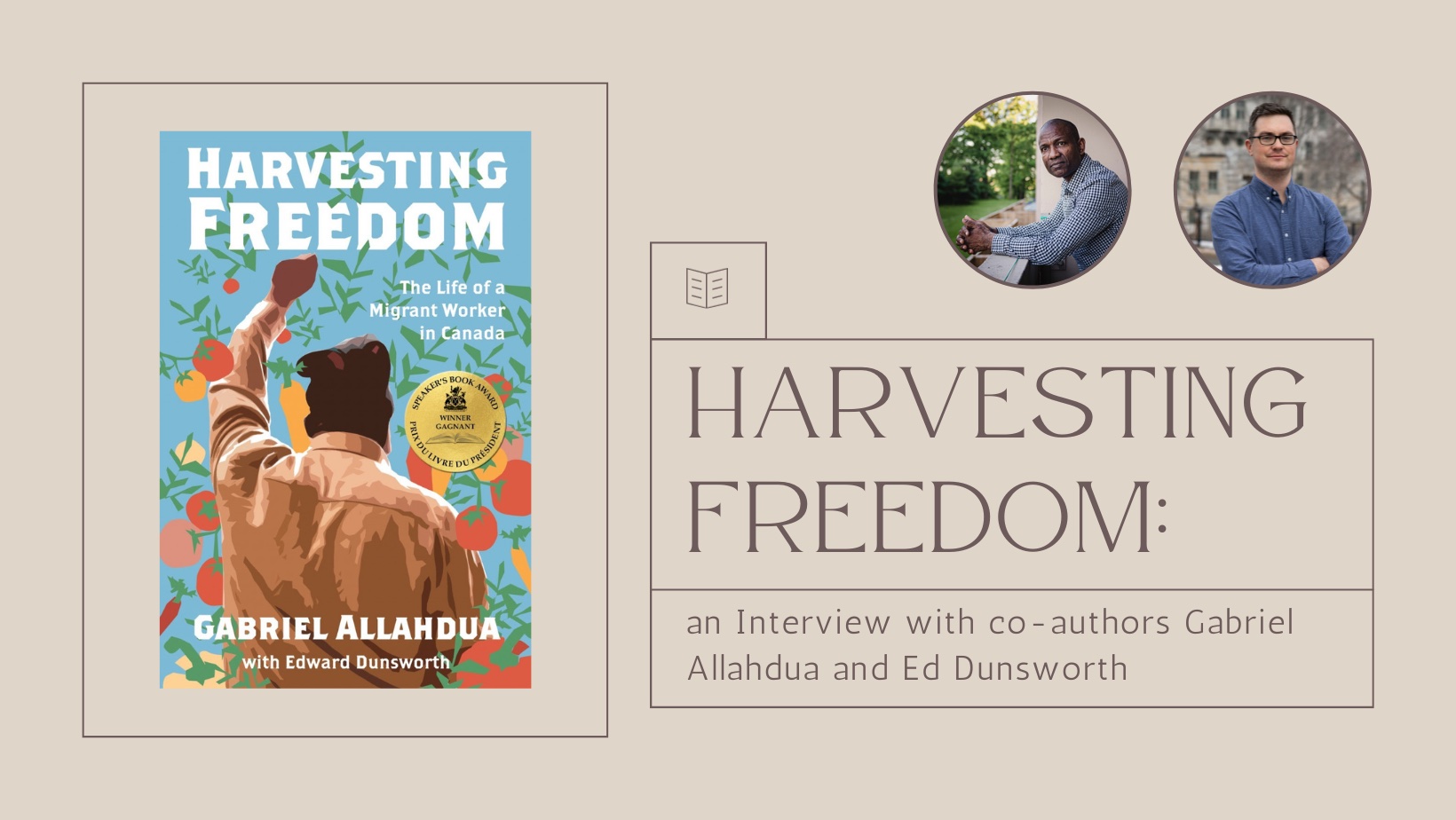
On Monday, Nov. 13, McGill will welcome migrant justice activist Gabriel Allahdua to discuss his award-winning book, Harvesting Freedom: Migrant Workers in Canada.
Co-authored by Ed Dunsworth, Assistant Professor, Department of History and Classical Studies, the book was recently awarded the Speakers Book Award from the Legislative Assembly of Ontario and the Mayworks Activist Award for Excellence in Contribution to Labour Arts.
It is the first book ever to be published by a former migrant worker and it reveals a disturbing system of exploitation at the heart of Canada’s farm labour system. This deeply personal memoir takes readers behind the scenes to see what life is really like for the people who produce Canada’s food.
Fighting for the rights of migrant workers
Allahdua and Dunsworth met in 2016 at the office of the then-Minister of Immigration, John McCallum, at a protest that aimed to highlight the unjust immigration policies that separated migrant workers from their families.
Allahdua, who worked as a migrant farm worker from 2012 to 2015, had recently sought permanent residency in Canada and began his work as an activist supporting the rights of migrant workers when he met Dunsworth in 2016. Allahdua and Dunsworth were both involved in the grassroots group Justicia for Migrant Workers, and after attending events, protests, and meetings, Dunsworth learned a lot about Allahdua’s experiences as a migrant worker in Canada.
“Gabriel has an incredibly powerful story, and he is an incredibly powerful storyteller,” says Dunsworth. The book is based on several interviews Dunsworth conducted with Allahdua over 2019 and 2020.
Denied basic workers’ rights
Allahdua’s decision to collaborate on this book stems from his continued work as an advocate for migrant workers’ rights. In Canada, migrant farm workers are not entitled to basic workers’ rights, such as employment insurance, and are rarely given the opportunity to apply for permanent residency in Canada.
“Reading the book, you will notice that migrant workers are denied and excluded from protections and laws that other workers in Canada have,” says Allahdua. “Migrant workers have a tied work permit, which means unlike a Canadian worker, they are not free to choose or change employers.”
The issue of tied work permits is the subject of a recent class-action lawsuit that seeks to abolish employer-specific work permits and issue open work permits to all migrant workers.
Mobilizing support
The book also serves as a tool to unite not only current migrant workers and other activists across Canada, but the general public as well.
“When [migrant] workers know that there’s a migrant worker who has written a book that pushes for better conditions, they are happy, they feel there’s hope,” says Allahdua. “After [speaking] events in PEI and Nova Scotia, I saw that the book was being used as a way to mobilize support in those provinces.”
Unjust immigration policies, exploitative and unsafe working conditions, short-term “flexible” employment contracts, and lack of employment insurance are just some of the realities migrant farm workers face when they come to work in Canada, and Allahdua hopes that this book will enlighten readers about the realities and obstacles facing migrant workers who work tirelessly in the harvesting and production of the food we consume.
“These injustices are at every level of government, and they are human-made, not natural, laws,” says Allahdua. “Politicians keep saying it’s not an issue in their riding and I’m hoping people will pressure their politicians to change those unjust policies.”
Food security
“Migrant worker issues are not issues in isolation,” says Allahdua. “Things such as short-term employment contracts are now being brought to mainstream employment.”
“We are all connected by food, the food that we eat, the migrant workers who produce it, and food security is dependent on how well these workers are treated,” says Allahdua. “Because if workers are not being treated fairly, do you think food security will continue? If you want a well-secured food system, you need to ensure that the workers are treated well.”
Monday’s event will also feature a sneak preview of the digital exhibition “The Human Cost of Food” which was created by McGill students under the supervision of Professor Ed Dunsworth.
The Harvesting Freedom event will take place on Monday, Nov. 13, at 6 p.m. in room 26 of the Leacock Building. Learn more.
People interested in supporting a petition for open work permits can consult the link here.

I’m reading Harvesting Freedom right now. Gabriel’s well-written and thoughtful book illuminates a subject that few Canadians know anything about. It should be read by everyone who is opposed to the exploitation of human beings for profit. Many will be shocked to learn how the Canadian government, Canadian employers and the countries of origin of these male and female workers treat these human beings. The book is a real eye opener.